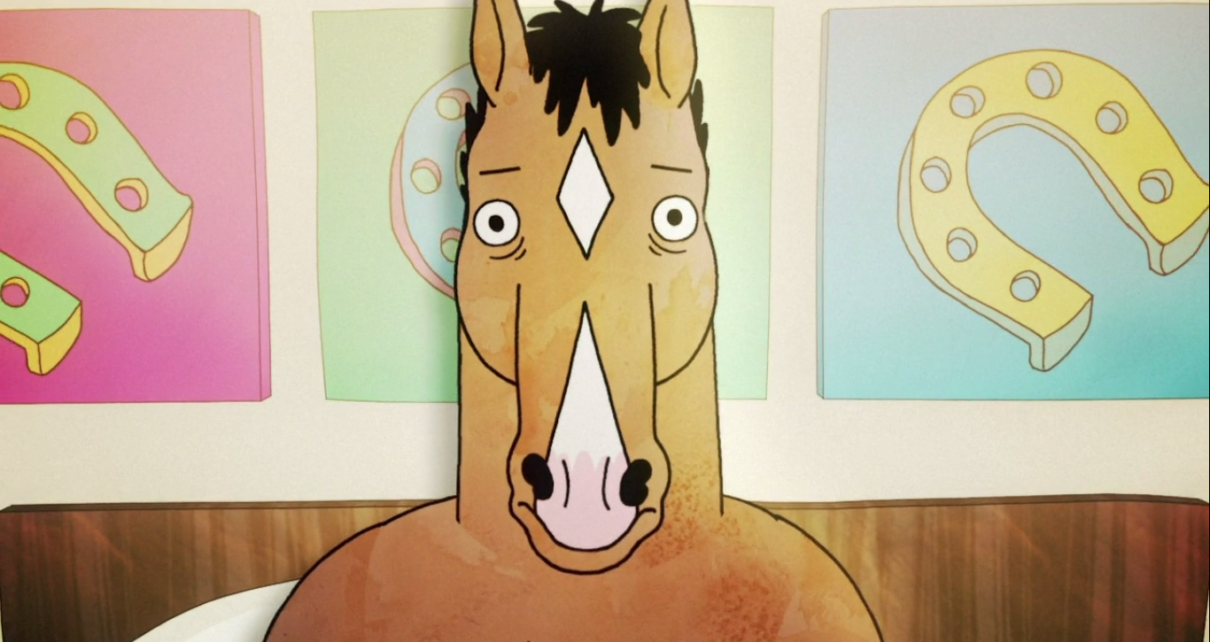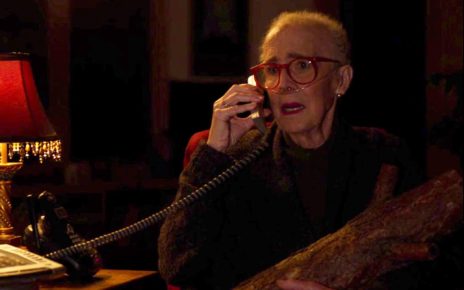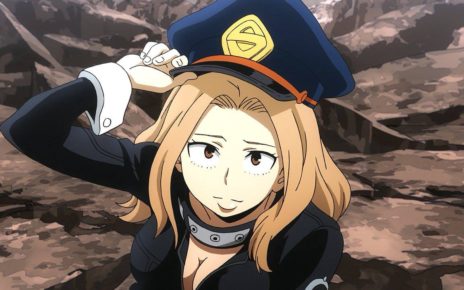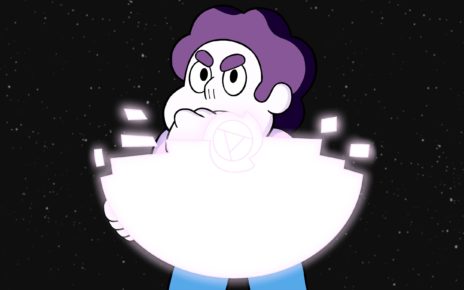
This post does not contain spoilers for BoJack Horseman Season 4.
I had no particular reason to want to watch BoJack Horseman. This is not because I was not consistently made aware of its brilliance, or because I somehow missed three seasons’ worth of excellent reviews, or because I wasn’t exhorted by some of my friends (including contributors to this site) to “holy shit, just watch it, it’s just as good as Rick & Morty and you run a goddamn cartoon site.” I was!
It was, rather, because I was forewarned equally consistently of its thematic content and general tone, both of which were described to me, variously, as “fucking miserable,” “fucking depressing as shit,” and “fucking ugh.” I was urged to stay away most vigorously during its third season, which debuted right around the time I was going through a particularly difficult time in my personal life, and I am not the kind of person for whom depressing cultural touchstones I’ve yet to connect with on a personal level are reassuring or comforting in the way in which they speak to that familiar despair within me. I am, in fact, a person who, upon watching such a show, stares dead-eyed (à la the BoJack opening credits, if you will) at the screen while ignoring other responsibilities until I’ve binged it all and end up feeling like I want to die.
So, instead, during that particularly hard period, I played the hell out of Skyrim for, like, the eighth time, picking off pixelated undead and bandit highwaymen with one variety of enchanted bow or another and ignoring my aforementioned responsibilities while marinating in the sort of mindless anti-Zen state into which fantasy RPGs tend to launch me.
It was the right decision. I know this because I was in a pretty great place this summer. Then I binged all of BoJack Horseman over the course of the past month. And now I want to die.
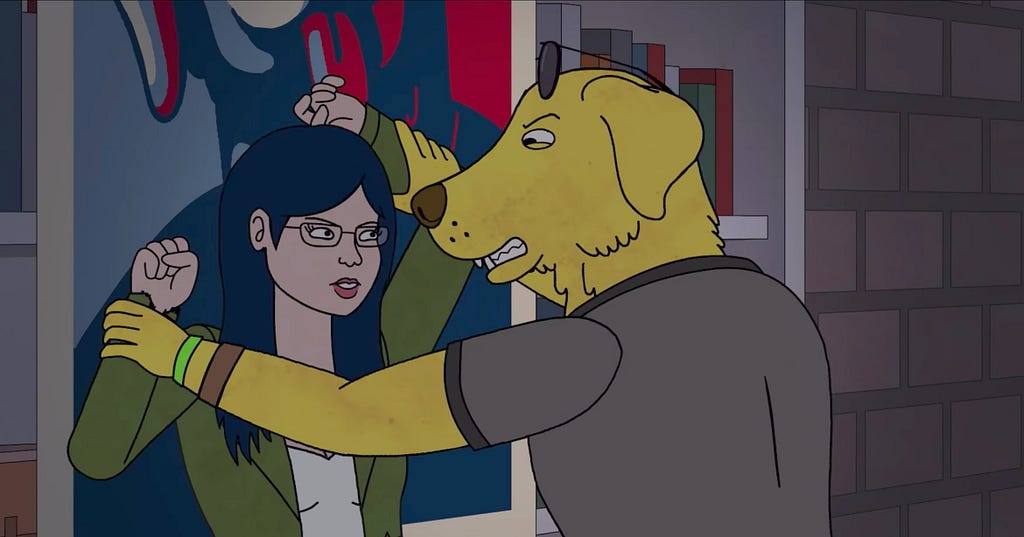
Why? Why would you watch this show? And don’t give me the “because I had heard it was great” or “because I’m a TV critic and it’s literally my job” reasons, because they are obviously very good reasons but unsatisfactory in the case of a rhetorical question. (All reasons are, but shut up, and come on, and shut up.)
There are plenty of grim cartoons in the world, many of which I love dearly. Venture Bros., Over the Garden Wall, Cowboy Bebop, and Rick & Morty are all some of my favorite shows, and each has moments of spectacular bleakness. But each also finds a way to strike some sort of emotional balance. After a few seasons of beating the living shit out of their characters, Jackson Publick and Doc Hammer seemed to finally feel so much affection for the failed people that make up the Venture family and its friends and foes that the show begins to grow genuine warmth. Pat McHale’s Over the Garden Wall was preoccupied with death and powerlessness, but the acceptance of both—and the responsibilities that acceptance entails—becomes inextricable from the show’s sheer beauty. Shinichirō Watanabe leaves open the possibility of reconciling a broken past with a future we get to choose in Cowboy Bebop. Even Dan Harmon and Justin Roiland of Rick & Morty let the Smiths and Sanchezes sort of find some peace from the meaninglessness of existence in the mindless joys of watching TV.
With BoJack, though—and, yes, I love BoJack too—we are talking about a show that provides almost no light as counterweight to its darkness. A show so preoccupied with hopelessness, with self-loathing, with misery both interpersonal and self-induced, and with the irreversible addiction to those behaviors that sustain all three that even its most level-headed characters cannot escape the pull of the abyss. (Maybe Charlotte Moore is an exception. Maybe.) Even the anthropomorphic Labrador retriever is secretly despondent! I couldn’t even write this article without my computer’s thesaurus app open so I could make sure I had enough synonyms for “dark” and “miserable.” (I’ll try not to abuse “wretched,” “doleful,” or “disconsolate,” but make no promises for “dolorous” or “woebegone.” They’re just so fun to say!)
Often, shows this dedicated to their own somber fatalism seem to show no empathy for their characters. Venture Bros., in some ways, was like this in its first couple of seasons, in which the titular family and its hangers-on’s habitual personal and professional failures were regaled in a series of long, dark, mocking jokes on characters whose motivations, as a whole, were either immoral, selfish, or foolish. But that changed as the show’s universe grew more expansive and more ambitious; the showrunners began not only to cut the Ventures some slack but to show that behind Doc’s brokenness and pettiness, and behind the boys’ childish idiocy, were the vestiges of the good, thoughtful people they might have been had the world, and their parents, not utterly fucked them up.
Their industry, their friends and acquaintances, their secret and not-so-secret selves — all of these hurt them over and over and over again.
With BoJack, it’s clearer earlier on that creator Raphael Bob-Waksberg holds affection for his characters. The difference is that he has never, ever—perhaps with the exception of dunderhead-with-a-heart-of-gold Todd Chavez—given them a break. And the seeming silliness of the show’s concept can make its unrelenting nature hit even harder. The whole show seems custom-built to serve as a giant middle finger to people who don’t think animation is for adults, or that its subject matter is inherently trite and fantastical. It’s as if Bob-Waksberg turned to his writing team and said, “We’re going to take this silly concept of animals in the entertainment industry and make it the most brutal thing ever. We’re going to hit our audience with every emotional gut-punch we can throw.”
And it does! It turns the audience’s fantastical expectations on its head; the concept is silly at first glance, but the themes are philosophically uncompromising and utterly universal. Because what other show could make an anthropomorphic horse who feels dead inside seem so damn real?
BoJack Horseman is a show starring talking animal celebrities in Hollywoo[d]. There’s no denying it. But it’s not about talking animals celebrities in Hollywoo[d]. It’s about their childhood traumas, their pained relations with their families, and their unfulfilling and tenuous connections to everyone they love in their adult lives because of their histories. It’s about addictions to love and to attention, to sadness and to careers, to fame and to self-pity. It’s about the inescapable grip of depression, which Winston Churchill frequently referred to as a “black dog.” (We’re still waiting on that visual gag, Raphael.)
Finally, this show starring talking animal celebrities in Hollywoo[d] is about—to paraphrase the show’s riff on the late, great J.D. Salinger—what they know. And what they know hurts them. Their industry, their friends and acquaintances, their secret and not-so-secret selves—all of these hurt them over and over and over again. Even the characters who seem closest to knowing enough about what they know to escape the dreadful pull of the dark depths of that self-knowledge can’t ever seem to reach to the top of the pit and climb the hell out. It’s just too familiar down there in that deep, dark well.
Perhaps Netflix, which pioneered the all-at-once method of releasing an entire season’s worth of episodes, is the perfect platform for a show about the painful addiction to one’s own pain and addictions. Binge-watching is, in itself, an addictive behavior, and binge behavior—binge-eating, binge-drinking—is, as most therapists will tell you, a mental disorder. The show almost dares you to stop watching it as it parades these pathetic and shattered people and their unending torment in front of you for a five-hour, 12-episode wretchedness-fest. But you won’t. You’ll sit there. And, most likely, just like I did when I finally caved into my friends’ exhortations, you’ll crush it. Even though it’s too much, man.

So why do we watch it? The obvious answer is that it is a brilliant show—and it is! But that’s a cheap, easy answer, and I won’t stand for it.
Another candidate is that, for one thing, some people actually find it funny! These people baffle me, but they exist. Over Labor Day weekend, I actually had a conversation about the show with a friend who is exactly this sort of person. I still personally cannot even comprehend watching BoJack exclusively for the laughs, or even simply finding that its jokes outweigh its sting.
But for those of us who see a darkness in BoJack that cannot be hidden by the craft or delivery of its jokes, the question remains: why do we watch it?
A friend of mine, the author Michael J Seidlinger, put it well: “You know that saying, ‘Misery loves company?’ Even if you’re not miserable while you’re watching BoJack, the fact that we have all been, or will be, miserable at some point in our lives makes it intimately relatable.”
There’s no arguing with that. Art isn’t supposed to be easy. As an A-tier sadboy once put it, art is hard. So is life. Maybe that’s justification enough. In the words of another insufferable bastard, Rob Gordon, who needs a drink?
So thanks, I guess, for making me watch. You goddamn monsters.
Thanks for reading The Dot and Line, where we talk about animation of all kinds. Don’t forget to ❤ this article and follow us on Twitter and Facebook.


